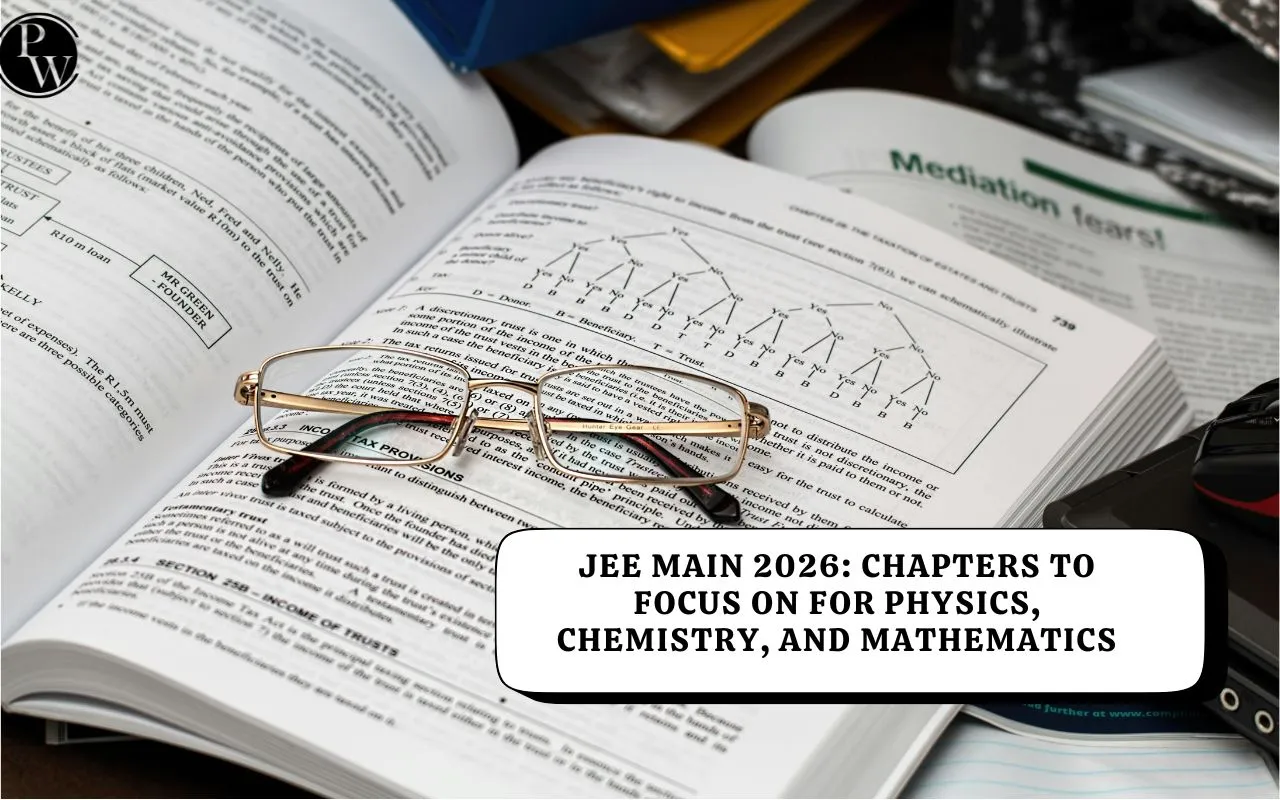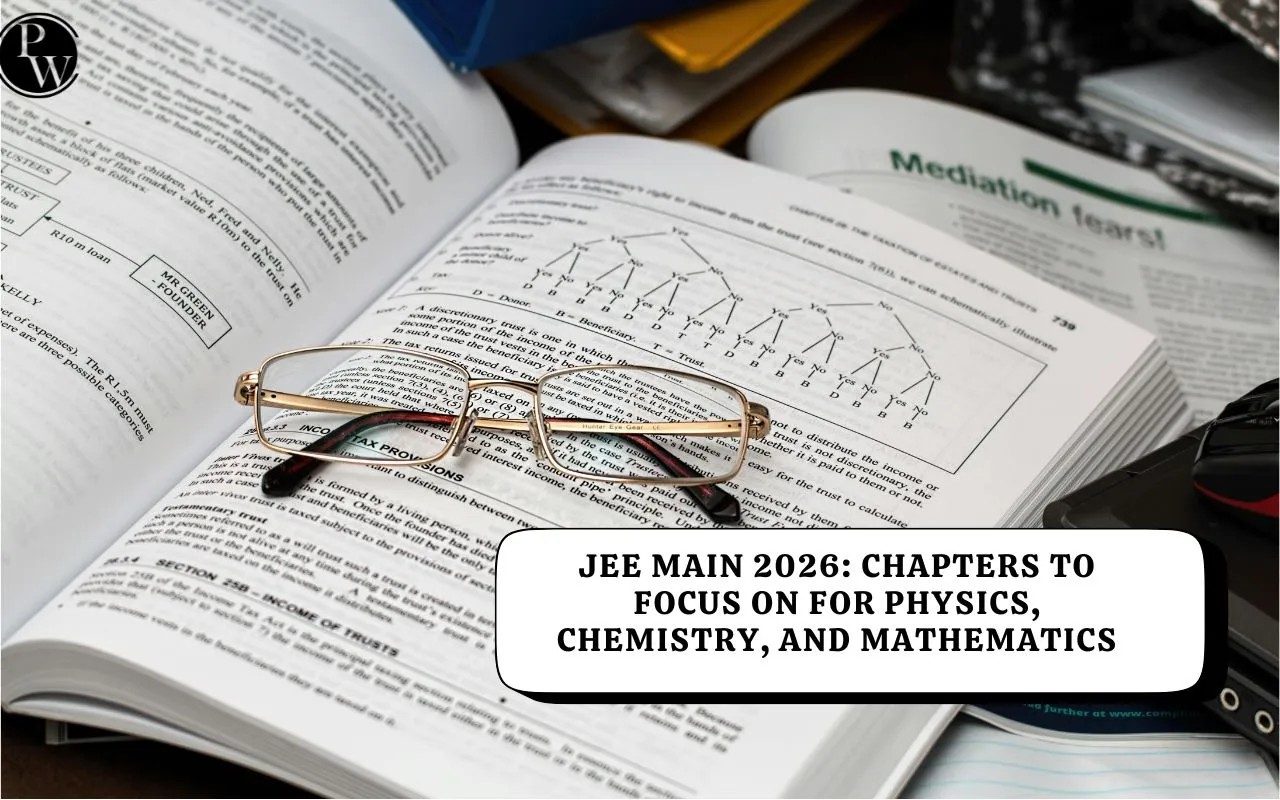

As the JEE Main 2026 exam approaches, students often face one major question: which chapters should I focus on first to maximise my score? Based on recent paper trends and expert analysis, here’s a clear, structured guide on which topics deserve priority in your revision for Physics, Chemistry, and Mathematics.
Physics: Heavy Lifters and Smart Scorers
Physics in JEE Main tests conceptual clarity and syllabus coverage rather than extreme depth. Some topics carry consistent weightage and can yield strong returns with focused revision.
Heavy Lifters (High Effort, High Reward)
-
Thermodynamics (with Kinetic Theory, Heat Transfer, Calorimetry, Thermal Expansion) – One of the most question-rich areas combining multiple subtopics.
-
Optics – A long but scoring topic. Focus on ray and wave optics, along with optical instruments.
-
Modern Physics – Evergreen for both JEE Main and Advanced. Covers photoelectric effect, atomic models, and nuclear physics.
-
Electrostatics
-
Current Electricity and Magnetic Effects of Current
These five to six topics together cover around 40–45% of the Physics paper. While Rotation is also important, it requires strong fundamentals in circular motion and Newton’s laws, so it’s better suited for those with consistent preparation.
Small Bomb, Big Impact (Quick and Scoring Topics)
-
Units and Dimensions, Errors and Measurements – Simple and guaranteed questions.
-
Wave Optics and Electromagnetic Waves – Focus on diffraction, polarization, and basic EM concepts.
-
Semiconductors – A favourite of JEE Main, almost always included.
-
Work, Power, Energy – Easier to prepare compared to other mechanics topics.
-
Gravitation – Compact and frequently asked.
Together, these smaller chapters contribute about 25–30% of the paper and are ideal for quick improvement during final revisions.
Mathematics: Smart Chapter Selection for High Yield
When revising Maths, start with topics that have shown consistent question patterns in recent exams.
-
Sequence and Series – Almost every shift includes at least one question.
-
Determinants and Matrices – Core topics like Cramer’s Rule and inverse matrices are frequently tested.
-
Binomial Theorem – Despite reduced syllabus, questions still appear regularly.
-
Vectors and 3D Geometry – Especially the shortest distance between two skew lines; appears almost every paper.
-
Coordinate Geometry – Includes straight lines, circles, parabola, ellipse, and hyperbola. Expect 4–5 questions collectively.
-
Quadratic Equations and Complex Numbers – Often tested together.
-
Permutation, Combination, Probability, and Statistics – One or two questions are typical.
-
Limits, Continuity, Differentiability, and Methods of Differentiation – Regularly tested.
-
Differential Equations – Always features in JEE Main.
-
Definite Integration and Area under the Curve – High-scoring if practiced well.
-
Trigonometry – Usually 1–2 questions per paper.
These topics collectively account for a major share of the Maths section and should be prioritised in revision order.
Chemistry: Key Topics Across Physical, Organic, and Inorganic
Chemistry offers an excellent scoring opportunity with proper concept-based preparation. The team identified about 10–11 chapters that have shown the highest frequency of questions.
Physical Chemistry
-
Some Basic Concepts of Chemistry – Essential foundation chapter; includes mole concept and stoichiometry.
-
Thermodynamics and Thermochemistry – Both important; numerical and conceptual questions appear regularly.
-
Solutions – Focus on abnormal molar mass and colligative properties.
-
Equilibrium (Chemical and Ionic) – Pay special attention to Le Chatelier’s principle, buffers, solubility product, and salt hydrolysis.
Organic Chemistry
-
General Organic Chemistry (GOC) – Core for reaction mechanisms and stability concepts.
-
Aldehydes, Ketones, and Carboxylic Acids – Reactions like Aldol and Cannizzaro are frequent.
-
Haloalkanes and Haloarenes – Especially optical isomerism and reaction mechanisms.
-
Purification and Characterisation of Organic Compounds – A short but guaranteed topic.
Inorganic Chemistry
-
Coordination Compounds – Hybridisation, magnetic moment, and isomerism are key areas.
-
d and f Block Elements – Properties of KMnO₄ and K₂Cr₂O₇, oxidation states, and color trends.
-
Classification of Elements and Periodicity – Basic but question-rich chapter.
Although Chemical Bonding is not in the top three by frequency, it remains essential as it forms the basis for many other topics.
Final Takeaway
If you are consistent in your final preparation and focus on these high-yield chapters, you can comfortably aim for 99 percentile and above. The idea is not to skip topics but to prioritise smartly — covering high-weight areas first while keeping the overall syllabus in sight.
Consistency, focused revision, and regular question practice remain the key to success in JEE Main 2026.
